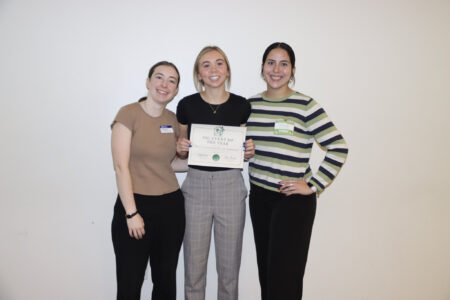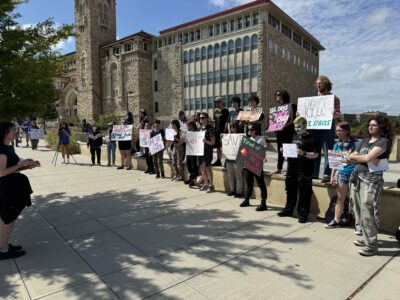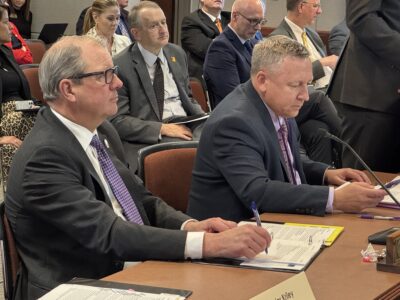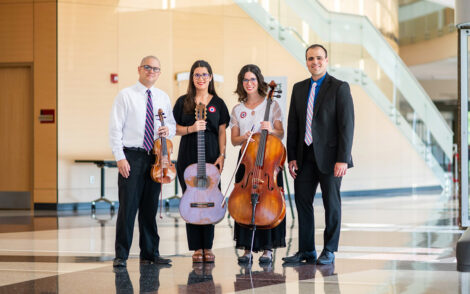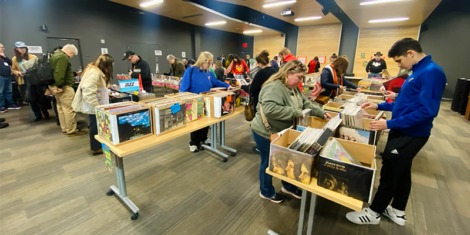KU will not hold Kansas Relays next spring; meet’s future schedule uncertain

Kansas hosts the 100th Kansas Relays on Friday, April 14, 2023 at Rock Chalk Park.
The Kansas Relays will not take place in the spring of 2026.
KU is cutting out the historic track meet this year as part of a broader effort to reduce expenses for the athletic department, athletic director Travis Goff told the Journal-World in an interview on Thursday afternoon.
“It really is tied most directly to expense management,” Goff said, “and just needing to get our legs underneath us in this new chapter with the House settlement having gone through, having (revenue sharing) and these new kind of required expense lines.”
What is not yet clear is what the future holds for the 102-year-old meet. Goff said KU will evaluate whether, for example, it could return as an event that only takes place every few years.
He said he hopes the meet’s absence is only temporary.
“This isn’t ‘never again,'” he said. “This is just, ‘We don’t yet know how best to manage the Relays going forward.’ And so for the betterment of the big picture, we’ve at least had to make a short-term decision here.”
The decision — which is expected to take off the books approximately $350,000 in gross expenses required to put on the event — is the latest in a series of cost-management moves.
As the Journal-World reported in May, KU Athletics gradually eliminated, via a combination of a hiring freeze, voluntary separations and layoffs, 30 employees from the department, in order to save $3 million. Goff later said during a KU Athletics board meeting in June that over a nine-month period, the department had found ways to reduce its expenses by more than $15 million in total, many of which were not expected to come to fruition until the fiscal year 2026.
Under the terms of the House v. NCAA settlement, which allows universities to directly pay student-athletes and went into effect in July, schools can furnish up to $20.5 million for revenue sharing.
“We had to find significant cost savings,” Goff said on Thursday, “and frankly speaking, a lot of things were on the table, whether it be trimming of budgets for programs and every kind of administrative aspect of the department, to things such as unique-considered special events, which the Relays kind of falls under that.”
Recently, KU chose not to hire a performing artist for the upcoming Late Night in the Phog. The six figures that such an artist would cost, Goff suggested, would be better spent on revenue sharing for the men’s and women’s basketball teams so that those teams can be maximally competitive. It’s not quite the same equation in track and field, as Goff said it’s not a “rev-share program,” but it is in some ways an analogous decision.
“You could almost view it as, keep the Relays but we’d have to find additional cuts in track and field to justify (that), and where we kind of netted out on that was we don’t want to pull back in other areas of investment in track and field just to keep and salvage the Relays,” Goff said. “Because we think that would have a more negative impact on KU track and field.”
The Relays have in their history primarily stopped for life-changing world-historical events. Outside a pair of three-year periods in which the meet went on hiatus due to World War II and the COVID-19 pandemic — and a couple of years away in 1998 and 1999 due to Memorial Stadium renovations — the meet has continued since 1923.
The meet was originally the brainchild of John Outland, the “father of the relays” best known as a football coach. He was inspired by the Penn Relays competition he had witnessed while a student at Penn and worked with KU’s then-AD (and legendary basketball coach) Phog Allen and track coach Karl Schlademan to bring a similar event to fruition at Memorial Stadium.
In the meet’s heyday — which was also the sport of track and field’s — tens of thousands of fans turned out to the stadium to see memorable efforts like Wes Santee’s attempt to run a four-minute mile in 1954. KU legend and onetime world-record holder Jim Ryun’s own effort at the mile in 1972 drew an estimated 32,000 spectators. More than three decades later, the university nearly replicated that effort with a turnout of 26,111, according to the Associated Press, during the 2006 meet for a “Gold Zone” competition featuring former Olympic gold medalists.
Many luminaries of KU Athletics, like Glenn Cunningham, Billy Mills and Al Oerter, and of track and field at large, like Veronica Campbell-Brown, Nawal El Moutawakel and Allyson Felix, have competed in the Kansas Relays over the course of its existence.
The event has also served as a key point of connection between the KU program and its alumni, a “magnet for generations” as Goff put it.
“That’s something we’ve taken into account with this initial decision to halt the Relays,” Goff said. “I think it remains to be seen. I’ve always felt like one event or one moment in time has never been the key to alumni engagement.
“To me, alumni engagement comes through a steady, consistent connection being made with the program; steady, consistent communication; consistent relationship building with a staff and getting to know student-athletes. So while I do appreciate the importance of the Relays, I think there are a lot of other ways to maintain and grow our connection to our letterwinners.”
Upon its return in 2023 from its pandemic-induced absence, the Kansas Relays received the World Athletics Heritage Plaque for the event’s historic contributions to the sport of track and field.
“We brought it back on earlier in my tenure … and undoubtedly were committed to it,” Goff said on Thursday. “Love what the Relays represents in the community and for KU, and we love its important place in track and field. So we didn’t start it with any kind of notion that that might be a fragile dynamic. But going through what we went through this past year on the expense-management side and having the new House-related implications has just forced that upon us.”
Most recently, the three-day meet hosted its latest edition in April with 5,500 entries from 4,600 competitors representing 106 colleges and 447 high schools, meet director Tim Byers said at the time. Planning for the event typically required preparation beginning as early as 12 to 16 months in advance.
Goff said that a bigger meet is generally more costly, and that KU had added “unique fun elements” like a drone show in 2024 to “ramp it up in a new way in this new chapter.”
He acknowledged that KU could potentially have chosen to preserve the Relays as a “bare-bones track-and-field tournament.”
“We don’t think that would be doing justice to the name and the brand of Kansas Relays,” he said, “and so we really want to have taken this step back to evaluate what the best path is going forward.”
He said head coach Stanley Redwine and the rest of the program will be well suited to judge which schedule is ultimately best for the meet in the future, and how an every-few-years schedule could potentially impact participation in the meet.
The Relays have never been totally safe from going under. As early as 1962, the University Daily Kansan suggested the event was experiencing “financial problems” and potentially “would be dropped from the KU athletic program,” as quoted in an article on KU’s website. The late former KU track coach Bob Timmons, whose tenure spanned from 1966 to 1988, said in 1995 that “we spent an awful lot of time fighting for our lives to save the meet” and that he felt he had seen it go downhill over time.
Yet the event persisted for decades longer and even experienced that success in the 2000s.
“Where we go from here, I just know we’ve got to be locked in and consistent from this point forward,” Goff said.
He said he wasn’t particularly concerned about the track facility at Rock Chalk Park, as a venue, losing a marquee event, and noted that KU wants to continue to host events there like the Big 12 Outdoor Track and Field Championship, as it did in May. Goff also said KU’s other meets could potentially “add a layer of value or impact or experience” at times when the Relays is not occurring — especially if that layer does not cost a lot of money. During the 2024-25 season, KU also hosted a Bob Timmons Challenge in December, a Jayhawk Spring Fling in March and a Rock Chalk Classic in April right after the Relays.
The $20.5 million cap for revenue-sharing dollars will increase in future years. That may not mean further cuts to events like the Relays. Goff said that KU proceeded through its expense-management exercise “with the objective to not have to continually find ways to create new dollars through cuts,” instead projecting that increased revenue in future years would pay for higher levels of revenue sharing.
In the meantime, Goff made a decision of which he said, “The reality is there’s no part of me that expects this to be totally embraced by any stretch of the imagination.”
“I’m hopeful that some, many, will appreciate the really significant change that’s occurred in collegiate athletics across the country, every single place,” he added, “where you’re having to really evaluate these things from a very different lens.”


